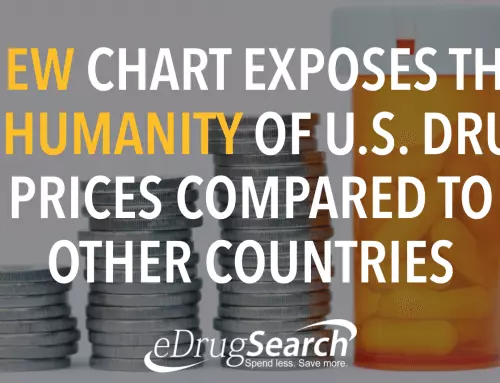With the best-selling osteoporosis drug Fosamax on trial amid allegations that it causes “jaw death” in patients, you might think healthcare consumers would rejoice at the prospect of a new alternative to Fosamax on the market.
You might think that — until you look at the price.
The new drug, Amgen’s Prolia (denosumab), is up for approval by an FDA advisory committee this week. The aspect of Prolia that has received the most attention is that it is a product of biotechnology. It is a new class of drug, a “fully human monoclonal antibody” designed to target a protein that causes bone loss.
Studies indicate that it works as well as or slightly better than Fosamax and other bisphosphonates, such as Actonel and Boniva.
The Los Angeles Times reports:
The drug “does everything you would want a drug to do in women to prevent fractures,” said Dr. John S. Adams, an orthopedic surgeon at UCLA’s Geffen School of Medicine…
“This appears to be the most potent of the osteoporosis drugs,” [said Dr. Frederick R.] Singer … director of the endocrine/bone disease program at John Wayne Cancer Institute in Santa Monica.
That’s the good news. Now the bad news: the price.
Amgen, the manufacturer of denosumab, has not said how much the drug will cost, but analysts expect it to be at least $2,000 a year — and potentially much higher — and predict yearly sales of $2 billion to $3 billion.
Already, many insurance companies are pushing physicians to the generic version of Fosamax, alendronate, which costs about $100 a year.
Keep in mind also that, in all likelihood, insurance companies will not cover Prolia with a simple copay, but instead will require patients to pay for a significant percentage of the cost of the drug out of pocket.
The backstory here is that Amgen has been touting Prolia as a new “blockbuster drug” to Wall Street for some time now. And Wall Street has rewarded Amgen handsomely. As BusinessWeek reports:
Wall Street has set an exceptionally high bar for Amgen (AMGN)’s new bone-loss treatment. Shares of the world’s largest biotechnology company have jumped 27% in the past three months, to 60, largely on news of clinical trials that showed the drug is as at least as effective, and sometimes better, than standard osteoporosis treatments when it comes to preventing and treating dangerous fractures.
Wall Street is expecting a windfall, and Amgen will price Prolia to deliver that windfall. Which means the drug won’t be such a windfall for healthcare consumers.


![[Video] Pharma “Bad Boy” Martin Shkreli Refused to Testify to Congress](/wp-content/uploads/2016/02/Pharma-22Bad-Boy22-Martin-Martin-Shkreli-500x383.png)











What is the product do, osteoblastic? osteoclastic inhibitor? Calcium depositor? Or?
A new drug is great news! I am a 54 y/o man w/ severe osteoporosis. It is unfortunate that the price is so high. Another example of the GREED that drives corporations nowadays and that is also driving the “health care overhaul” in the US! What happened to the concept of people helping out others to make life better for all of us?
I have been taken off of Fosamax as I have been on it for over 12 years. My Doctor first prescribed Forteo, which is a daily injection for 2 years. I refused due to the cost of the drug. He then prescribed Prolia. Which is an injection twice a year. Is the a time frame for Prolia, such as 2 years like Forteo? What is the difference in the cost of Prolia and Forteo? Whick of these treatments is the best?
I have Rhumatoid arthritis and food and preservative allergies. I’m worried about Prolia injection side affects.
My question is posted above, but I have received no answer to my question. The only thing I have heard is that Forteo builds bone as well as prevents bone loss and Prolia only prevents loss. Is this correct? Oh, and Forteo is much much more expensive.
I took forteo for two years giving myself a daily shot, so I can’t take it again. Â I will begin Prolia shortly. Â I’m 77, ski, ride horses, dog sled, zip-line, am a fitness trainer and work out almost daily with my own trainer. Â I also take a yoga/strength class every Saturday AM for flexibility and better balance. Â I still have severe osteoporosis but you’d never know it. Â My posture is fortunately straight and I’m the same 5’1″ tall as I was at age 20 and still weigh the same 104 lbs. Â I’ve had lots of bone breaks but they’ve all been trauma induced – thrown off a horse twice (pelvis, then sacrum age 65 & 68), fallen off a ladder (3 foot bones age 72) hit by a car (tibia-age 12) knocked over by my big dog (ulna-age 70) and so on.
Jean, Prolia has no time frame…patients have been taking it since 2004 in the clinical trials, and it costs less than Forteo. It will increase your bone density and prevent fractures.
does Prolia have Bioshofonates
How much does prolia cost?
I am thinking about
taking Prolia injections but would
like to hear from some women who have
already been treated
with this drug to find out about any side effects they have experienced. Please write to me at .
I had reaction of vertigo and had to go to the ER I was so sick after taking Prolia. Now I have worse pain in my bones. How long do these side effects last?
Please compare Prolia vs Boniva so that I can make an informed decision.
In my opinion, I wish I had taken the Boniva like my orthopedist suggested. Instead I took my family doctors advice and after taking Prolia I have been nothing but sick with UTIs,vertigo and more trouble with walking.
Would like to see comparison between Prolia and Reclast
Please register and submit all your drug reviews and feedback here: /drug-ratings-reviews
We would love to here what you’ve learned so you can help others 🙂
I wish you would answer Mailyn’s question (“How much does Prolia cost). Even if you are not dirt poor, and ins. does not cover is, is there anyway to get some assistance?
Here are some prices on Prolia: /compare-drug-prices-buy-online/Prolia
I’d like to know if this drug is more risky for someone my mother’s age – 93. Her primary physician recommends it, but I’d like to know the experiences other people over 85 had after getting this.
I have suffered from vertigo in the past and am afraid to try Prolia. And the thought of my skin returning to those teenage years if unsettling.
I just found out that the price for Prolia is $2,000 a year. OMG that is $1,000 per injection! Clearly the drug company does not care about the user–they are only looking at their profits! How sad!
You’re crazy. Â They put millions into research and development. Â Some insurance pays for it. Â We older women are lucky to have it available.
My intern has prescribed Prolia for my ‘severe’ osteoporosis. Should I consult a specialist before making a decision. My T-score was 2.9. I’m only 57 years old.
I had a T-score of 2.9. Should I consult a specialist or take treatment advice from my intern?
My wife’s oncology Dr. is suggesting Prolia but the side effects are extremely dangerous. What do you think?
I can’t understand why those people who spent years on Fosamax with little or no success should now switch to Prolia. Â I have just completed a two year course of Forteo with great success, an increase, overall of 13%. Â My endocrinologist has suggested I begin the twice yearly injection of Prolia. Â Why would this provide me with better results than Fosamax?
I am inquiring on behalf of my 92 year old mother. The geriatrician prescribed prolia; her general practitioner thought about the prescription for prolia approximately 2 days and then approved the prolia.
Initially my mother had been taking actonel but has not taken this medication for apprx one year, for no reason other than she had been taking cerain antibioitics and elected to not take the actonel in combination.
My question is:if there would be any side affects with prolia, as it is an injection which lasts approx 6 months, would it not be more difficult and time consuming to eliminate the prolia and its related side affects from the body versus the actonel, which would just be stopped immediately if any side affects occurred.
Thank you for your time to respond.
I am 64, small build and was on Fosamax for years and it did nothing to build my bones – kept losing bone mass despite daily exercise, weight training, Yoga,etc. My doctor recommended Prolia; her office checked with my insurance through a Prolia sales rep. The rep called me and assured me I would only have to pay a $50 co-pay. Guess what…..my insurance rejected it and now I am being billed $1500 for one injection. Something is wrong with this picture and I suspect the drug manufacturer falsely advised me just to make a “sale.” I will definitely not have this injection again. The drug company is a rip-off. If you decide to have it, make DOUBLY SURE your insurance will pay for it and get it in writing. Do not accept a phone call approval.
I am surprised to see so many taking very dangerous drugs with so many side effects and costs as a REPLACEMENT for CALCIUM. Think about it. The emperor wears no clothes. Do your research, please!
If your muscles are not being used, and you are lacking in calcium, then the body will take the calcium from wherever it can be found – primarily the bones.
Calcium is needed daily, but it cannot be digested without magnesium. So take a good supplement that supplies both and try strengthening your muscles with weights. That is how to fight osteoporosis, and don’t let any MD, who never took a class in nutrition, tell you any different.
As a matter of fact, your first question to the doctor ought to be: how much do you profit when you prescribe this (or any) drug? Herein lies the problem, dear reader, that big pharm has such a death-hold grip on the medical industry that even the medical schools are compromised.
One of these days, with the help of the Internet and forums like these, the veil will be lifted, and the real truth will be evident: the emperor wears no clothes. These drugs are made from the same ingredients you’ll find in your cleaning products under your kitchen sink.
He says it does everything you’d want a drug to do…..but it doesn’t BUILD NEW BONE! It does the same thing Bisphosphonates do and can lead to femur fractures and dead jaw. Accumulating old bone does not solve the problem. Also looking at the trial results it was not much more effective than a placebo. Please look at the data not the cooked results.
There is assistance with the cost of Prolia,ask your Ins.Co to refer you for Grant.